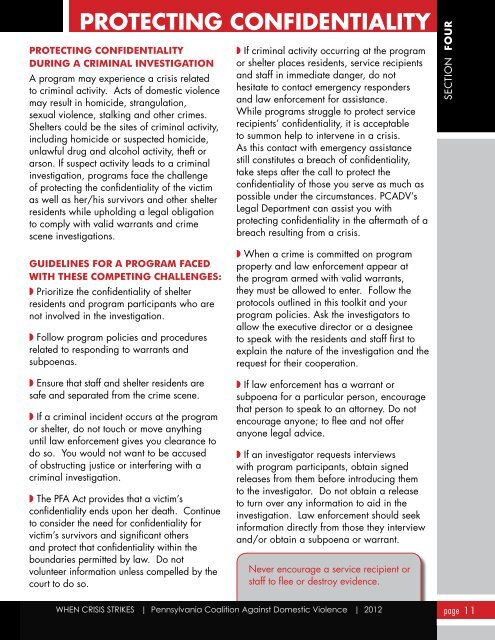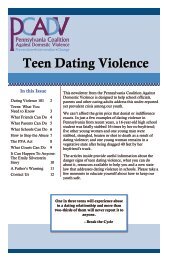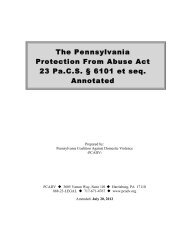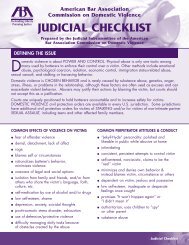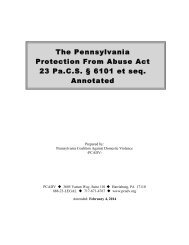Toolkit with Report Form - Pennsylvania Coalition Against Domestic ...
Toolkit with Report Form - Pennsylvania Coalition Against Domestic ...
Toolkit with Report Form - Pennsylvania Coalition Against Domestic ...
You also want an ePaper? Increase the reach of your titles
YUMPU automatically turns print PDFs into web optimized ePapers that Google loves.
PROTECTING CONFIDENTIALITY<br />
Protecting Confidentiality<br />
during a Criminal Investigation<br />
A program may experience a crisis related<br />
to criminal activity. Acts of domestic violence<br />
may result in homicide, strangulation,<br />
sexual violence, stalking and other crimes.<br />
Shelters could be the sites of criminal activity,<br />
including homicide or suspected homicide,<br />
unlawful drug and alcohol activity, theft or<br />
arson. If suspect activity leads to a criminal<br />
investigation, programs face the challenge<br />
of protecting the confidentiality of the victim<br />
as well as her/his survivors and other shelter<br />
residents while upholding a legal obligation<br />
to comply <strong>with</strong> valid warrants and crime<br />
scene investigations.<br />
◗ If criminal activity occurring at the program<br />
or shelter places residents, service recipients<br />
and staff in immediate danger, do not<br />
hesitate to contact emergency responders<br />
and law enforcement for assistance.<br />
While programs struggle to protect service<br />
recipients’ confidentiality, it is acceptable<br />
to summon help to intervene in a crisis.<br />
As this contact <strong>with</strong> emergency assistance<br />
still constitutes a breach of confidentiality,<br />
take steps after the call to protect the<br />
confidentiality of those you serve as much as<br />
possible under the circumstances. PCADV’s<br />
Legal Department can assist you <strong>with</strong><br />
protecting confidentiality in the aftermath of a<br />
breach resulting from a crisis.<br />
Section four<br />
Guidelines for a program faced<br />
<strong>with</strong> these competing challenges:<br />
◗ Prioritize the confidentiality of shelter<br />
residents and program participants who are<br />
not involved in the investigation.<br />
◗ Follow program policies and procedures<br />
related to responding to warrants and<br />
subpoenas.<br />
◗ Ensure that staff and shelter residents are<br />
safe and separated from the crime scene.<br />
◗ If a criminal incident occurs at the program<br />
or shelter, do not touch or move anything<br />
until law enforcement gives you clearance to<br />
do so. You would not want to be accused<br />
of obstructing justice or interfering <strong>with</strong> a<br />
criminal investigation.<br />
◗ The PFA Act provides that a victim’s<br />
confidentiality ends upon her death. Continue<br />
to consider the need for confidentiality for<br />
victim’s survivors and significant others<br />
and protect that confidentiality <strong>with</strong>in the<br />
boundaries permitted by law. Do not<br />
volunteer information unless compelled by the<br />
court to do so.<br />
◗ When a crime is committed on program<br />
property and law enforcement appear at<br />
the program armed <strong>with</strong> valid warrants,<br />
they must be allowed to enter. Follow the<br />
protocols outlined in this toolkit and your<br />
program policies. Ask the investigators to<br />
allow the executive director or a designee<br />
to speak <strong>with</strong> the residents and staff first to<br />
explain the nature of the investigation and the<br />
request for their cooperation.<br />
◗ If law enforcement has a warrant or<br />
subpoena for a particular person, encourage<br />
that person to speak to an attorney. Do not<br />
encourage anyone; to flee and not offer<br />
anyone legal advice.<br />
◗ If an investigator requests interviews<br />
<strong>with</strong> program participants, obtain signed<br />
releases from them before introducing them<br />
to the investigator. Do not obtain a release<br />
to turn over any information to aid in the<br />
investigation. Law enforcement should seek<br />
information directly from those they interview<br />
and/or obtain a subpoena or warrant.<br />
Never encourage a service recipient or<br />
staff to flee or destroy evidence.<br />
When Crisis Strikes | <strong>Pennsylvania</strong> <strong>Coalition</strong> <strong>Against</strong> <strong>Domestic</strong> Violence | 2012 page 11


